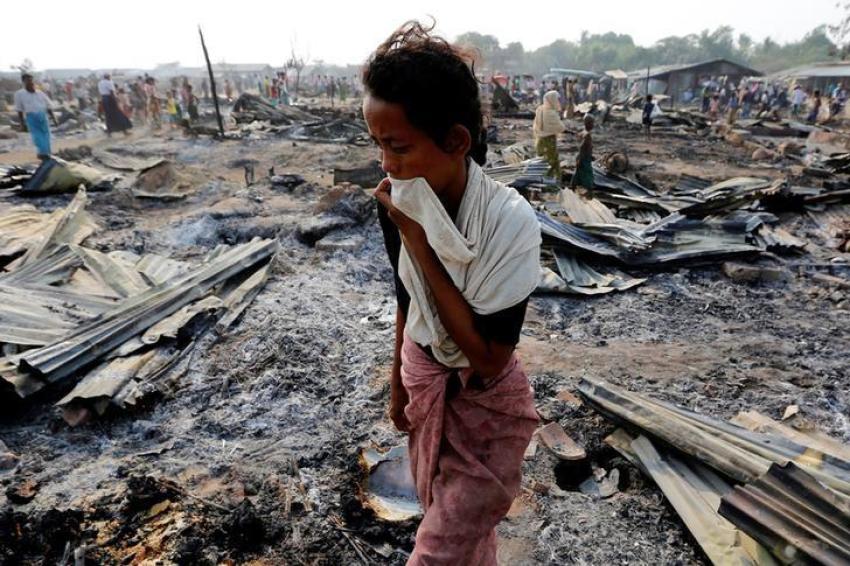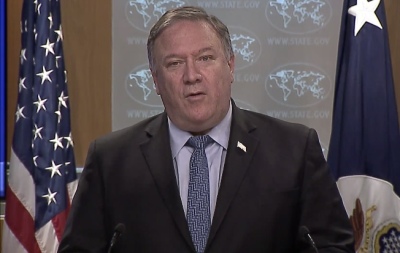State Dept. releases religious freedom report: A 'chilling array of abuses' committed in 2018

The U.S. State Department released its annual report on international religious freedom on Friday and announced that it will strengthen its office that oversees international religious freedom issues.
Secretary of State Mike Pompeo gave a brief address at a press conference unveiling the report, which serves as a “report card” tracking countries’ progress on religious freedom in 2018.

Pompeo called out countries such as Iran, Russia, Myanmar, and China for their abuses of religious freedom and praised positive steps taken in nations such as Uzbekistan and Pakistan.
“Unfortunately, [2018] was far from perfect,” Pompeo said. “As in previous years, our report exposes a chilling array of abuses committed by oppressive regimes, violent extremist groups, and individual citizens. For all those who run roughshod over religious freedom, I’ll just say this: the United States is watching and you will be held to account.”
“History will not be silent about these abuses,” he added. “But only voices of liberty like ours record it.”
The report is compiled by the State Department’s Office of International Religious Freedom, which is led by Ambassador-at-large for International Religious Freedom Sam Brownback.
The position was created under the International Religious Freedom Act of 1998. Religious Freedom activists have long called for the office to be strengthened when it comes to its influence on U.S. foreign policy.
Pompeo announced at the press briefing that he is elevating the Office of International Religious Freedom and Office of the Special Envoy to monitor and combat anti-Semitism within the State Department.
“Effectively immediately, each of these two offices will report directly to the undersecretary for civilian, security, democracy and human rights,” he explained. “Sam Brownback, the ambassador-at-large for religious freedom, will continue to report directly to me.”
Pompeo added that the reorganization will provide each of those offices with additional staff and resources.
“It will empower them to carry out their important mandates,” he assured.
Speaking about the report, Pompeo noted the progress made by Uzbekistan, which last year was removed from the State Department’s list of “countries of particular concern” for international religious freedom violations, a designation that carries with it the possibility of sanctions.
“For the first time in 13 years, [Uzbekistan] is no longer designated a CPC,” Pompeo said. “This past year, the government released a religious freedom roadmap. Fifteen-hundred religious prisoners have been freed and 16,000 people that were blacklisted for their religious affiliation are now allowed to travel.”
Pompeo also praised Pakistan, which was designated a CPC last year, for the fact that Catholic mother Asia Bibi was acquited by the Pakistan Supreme Court and released from death row after spending about a decade in prison on blasphemy charges.
Pompeo was critical of Iran, which continues to crack down on Baha'is, Christian, and other religious minorities.
Brownback, a former governor of Kansas and U.S. senator, told reporters that Iran “continues to show a blatant disregard for protecting individuals' religious freedom.”
“Iranian religious minorities including Bahaiis, Christians, Jews, Zoarastains, Sunni and Sufi Muslims faced discrimination, harassment, and unjust imprisonment because of their beliefs,” Brownback said. “Their religious books are banned. They are denied access to education and their cemeteries are desecrated.”
“Last year, the Iranian regime violently cracked down on a peaceful protest of Sufi dervishes … in what Human Rights Watch called one of the largest crackdowns on a religious minority in Iran in a decade,” he added.
This year’s report includes a special section on China’s detention of at least 800,000 to possibly over 2 million Uighur Muslims, ethnic Kazakhs, and members of other Muslims groups in the Xinjiang province.
Brownback declared that the detention camps these prisoners are held in are “designed to strip away the culture, identity, and faith of these religious communities.”
“We share reports that others make that Chinese authorities have subjected prisoners of conscience, including Fulan Gong, Uighurs, Tibetan Buddhists, and underground Christians to forcible organ harvesting,” Brownback added. “This should shock everyone’s consciences.”
Brownback has been vocal about his disgust with the Communist Party of China’s disregard for religious freedom, calling it a “war on faith.” Pompeo contended that “the party demands that it alone be called God.”
Brownback said that while religious persecution in China in the past has been more regional, it has become more of a national policy for the Communist Party, leading to increased repression of Christians, the shutting down of churches and the arresting of religious adherents.
“To this, we say to China, you will not win your war on faith,” Brownback declared. “This will have consequences on your standing at home and around the world.”
Brownback also criticized the government in the central American nation of Nicaragua.
“Religious leaders report constant surveillance, intimidation, and threats,” he said. “The national police assault priests in full daylight, revealing the government’s contempt for religious leaders they deem as a threat to their authority.”
In Myanmar, where hundreds of thousands of predominantly Muslim Rohingya have been driven from their homes into neighboring Bangladesh by the military, Brownback assured that more needs to be done to ensure that these Muslim communities are able to return to their homes.
“We haven’t seen positive action,” he said. “We do support what the U.N. is doing in Burma in dealing with the Rohingya. The world community has to continue to take note of this and see what it is going to take to get something positive in place.”
Brownback explained that he has worked often with Pakistan in the past. He expressed hope that there will be more progress with the Asian nation on the issue of religious freedom.
In addition to being designated a CPC last year, Pakistan is also ranked by Open Doors USA as the fifth worst nation in the world when it comes to Christian persecution.
Although Pompeo praised Asia Bibi’s release from her blasphemy charge, he emphasized that there are over 40 others who remain jailed for life or face execution on that same charge.
“We hope to get into some key negotiations with Pakistan that will move them forward on protecting their religious minorities,” Brownback said. “We have a keen eye focus on them to help them get off [the CPC list]. But they are going to have to take action themselves.”
Brownback also vowed to continue raising the religious freedom issue with Saudi Arabia, a key trade partner for the U.S. In April, Saudia Arabia executed over 30 Shia Muslims who were convicted of terror and espionage charges through “unfair trials.” According to Human Rights Watch, the mass execution was the largest since January 2016.
“I think there was a lot of hope at first with the change in leadership that things would open up substantially,” Brownback said. “We see actions take place in a positive direction. But they continue to be one of the worst actors in the world on religious persecution.”
Pompeo then criticized Russia over its treatment of Jehovah's Witnesses.
“Jehovah's Witnesses were absurdly branded as terrorists, as authorities confiscated their property and threatened their families,” he said.
The 2019 report’s release precedes the State Department’s second-annual Ministerial on International Religious Freedom, which will be held in July at the State Department's office in Foggy Bottom.
Over 1,000 representatives, activists and religious leaders from across the globe will gather for the three-day event. Brownback declared that this year’s ministerial will be “bigger, broader, and better” than last year’s inaugural ministerial.
“It was truly a show of unity,” Pompeo said. “People of all faiths standing up for the most basic of all human rights.”
Last year’s ministerial inspired similar events to be hosted in Taiwan and the United Arab Emirates.
In Washington, D.C., Brownback said that the International Religious Freedom’s office has increased its engagement with the NGO community and expanded its religious freedom roundtable held every Tuesday on Capitol Hill.
“We have supported religious freedom roundtables starting up in other countries around the world,” he said. “A grassroots movement for religious freedom is beginning to take hold around the world."
Follow Samuel Smith on Twitter: @IamSamSmith
or Facebook: SamuelSmithCP



























